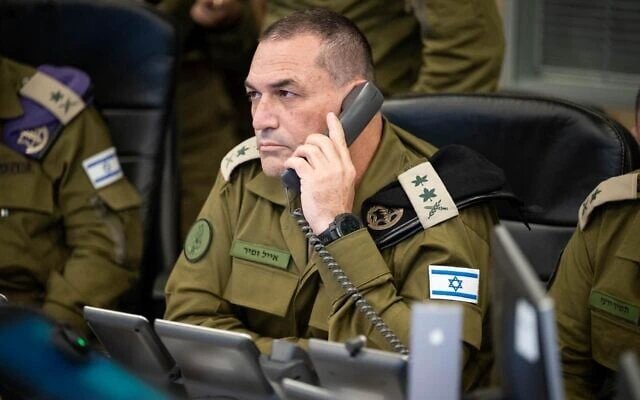Israeli military vows to topple Hamas regime despite rising tensions

(DDM) – The Israeli Defense Forces (IDF) are preparing for a major military offensive in Gaza City, with a clear directive to dismantle Hamas’ rule.
Diaspora Digital Media (DDM) gathered that this plan was outlined on Wednesday, August 10, 2025, in a high-level briefing by Chief of Staff Lt. Gen. Eyal Zamir.
Zamir declared that the mission to bring down Hamas was non-negotiable.
He insisted that the IDF’s objectives remain firm, stressing that no obstacle would stop them from completing the task.
According to him, the IDF leadership views this campaign as essential not only for national security but also for the moral responsibility of safeguarding Israel.
The IDF’s strategy is anchored on two critical priorities.
First, Zamir said there is a pressing moral duty to secure the release of hostages.
He described this as the most urgent mission currently facing the military.
Second, he reaffirmed the determination to strip Hamas of political and military control in Gaza.
Zamir framed these goals as defining moments for the present generation of IDF leaders.
He stressed that these are not temporary measures but long-term security objectives rooted in Israel’s survival.
The IDF chief pointed to recent strikes that demonstrated Israel’s expanding reach.
He cited a targeted operation carried out in Qatar within the past 24 hours as proof of the army’s resolve.
Zamir declared that Hamas would be pursued relentlessly, not only in Gaza but across Judea, Samaria, and any other location where the group operates.
This reflects a wider Israeli strategy to weaken Hamas’ regional networks.
Military analysts say Israel has been battling Hamas in a drawn-out conflict for nearly two years.
The prolonged confrontation has destabilized Gaza, intensified humanitarian concerns, and tested regional alliances.
Zamir admitted that the conflict is now moving into a decisive phase that could reshape the Middle East’s power dynamics.
Observers believe this escalation could deepen tensions with neighboring countries, while also attracting global attention.
The IDF’s readiness to expand operations beyond Gaza underscores Israel’s view of Hamas as a transnational threat.
For Zamir, the mission is personal and generational, meant to ensure that Hamas no longer governs Gaza or poses a danger to Israel.
However, the military escalation raises questions about the humanitarian toll.
Past offensives in Gaza have left widespread destruction, sparking criticism from human rights groups and international observers.
Despite this, Israeli leaders argue that Hamas’ presence in Gaza poses an existential threat to their nation.
Hamas, which has ruled Gaza since 2007, is considered a terrorist organization by Israel, the United States, and the European Union.
The group has launched thousands of rockets into Israeli territory over the years, leading to repeated rounds of conflict.
Israel maintains that its operations are defensive, aimed at neutralizing Hamas’ military infrastructure.
Yet Palestinians argue that Israel’s blockade of Gaza and repeated airstrikes have created unbearable living conditions.
The United Nations has frequently warned that Gaza is on the verge of total humanitarian collapse.
Hospitals are overstretched, electricity is limited, and clean water remains scarce for much of the population.
Civilian casualties in past IDF campaigns have drawn widespread condemnation, fueling calls for restraint.
Still, Zamir emphasized that dismantling Hamas is the only path to long-term peace and security.
He described the mission as both strategic and moral, portraying Hamas as a barrier to peace in the region.
The Israeli government has also faced domestic pressure to act more decisively against Hamas.
Families of hostages have staged public demonstrations, urging the government not to abandon their loved ones.
The IDF has made hostage rescue a top priority, acknowledging the emotional weight it carries for the nation.
Zamir said that Israel cannot allow a situation where its citizens live under constant threat from militant groups.
Regional reactions to Israel’s plans remain mixed.
Some Arab nations have condemned Israeli offensives in the past, calling for negotiations instead of escalation.
Others, particularly those aligned against Iran, have quietly supported Israel’s tough stance on Hamas.
The conflict’s geopolitical dimensions are significant, as Hamas receives backing from Tehran and maintains links with Hezbollah.
This raises fears that a wider confrontation could emerge if Israel intensifies strikes in Gaza and beyond.
The United States has historically supported Israel’s right to defend itself but has urged caution in minimizing civilian harm.
European nations have called for restraint, warning that another large-scale war in Gaza could destabilize the entire region.
Yet Israel appears determined to press forward, seeing this moment as a turning point.
Zamir’s language, describing the mission as unstoppable, signals the IDF’s uncompromising approach.
The nearly two-year conflict has already taken a heavy toll on both Israelis and Palestinians.
For many in Gaza, the constant cycle of airstrikes and shortages has deepened despair.
For Israelis, continued rocket attacks have reinforced a sense of vulnerability and urgency.
As the IDF gears up for what could be the largest campaign against Hamas in years, uncertainty looms.
The coming weeks may determine whether Zamir’s hardline approach leads to the fall of Hamas or to another prolonged war.
For now, Israel stands at a crossroads, balancing its determination to topple Hamas with the international pressure to avoid a humanitarian disaster.
Post Views: 15




